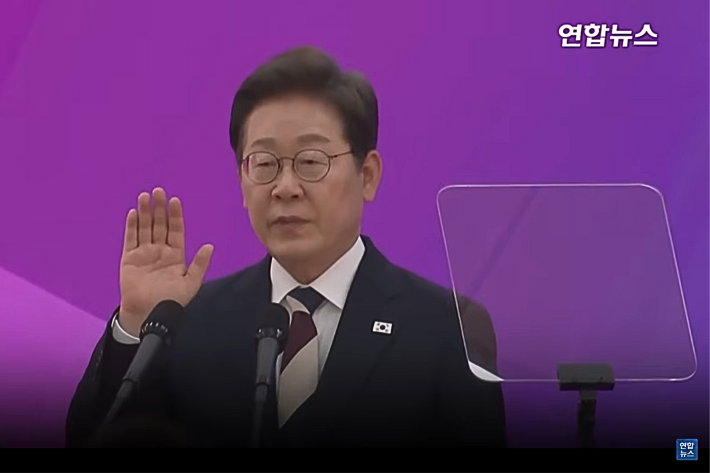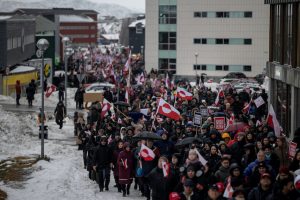South Korea’s newly elected leader President Lee Jae-myung will keep trade talks with the United States at the top of his agenda but will not rush into any deals, people familiar with the ruling party’s thinking have told Reuters.
Lee took office hours after winning the June 3 snap presidential election, and skipped the usual two-month transition period, following an extended period of political chaos in the country.
One the eve of the elections, he said that “the most pressing matter is trade negotiations with the United States.”
Also on AF: US Wants Vietnam To Cut Trade With China As Part Of Tariff Deal
But he has previously also stressed that there is no need to rush into clinching a deal and the deadline of July 8.
During his election campaign too, Lee did not make specific comments about contentious issues around the trade talks. That “silence” was a strategic move, a party official told Reuters.
Lee inherits an economy that is expected to grow this year by a grim 0.8%, the weakest since 2020. He will also need to unify a country deeply polarised by ousted President Yoon Suk Yeol’s botched martial law attempt.
At such a time, the future of South Korea’s export-oriented economy will hinge on what kind of deal Lee can strike, with all of his country’s key sectors from chips to autos and shipbuilding heavily exposed to global trade.
And the new president is likely to look to leverage key South Korean industries in dialogue with the Trump Administration.
Given its strength in key sectors of US interest, such as shipbuilding and technology, some analysts see South Korea as better positioned than others in Asia for upcoming trade dialogues with the US.
“Successful outcomes require offers that support the president’s domestic agenda, and this will be comparatively easy for Korea given its importance in politically sensitive industries,” said Jay Truesdale, a former US diplomat and CEO of TD International, an advisory firm in Washington, DC.
Kathleen Oh, Morgan Stanley’s chief Korea and Taiwan economist, said: “We believe there may be more channels and enough scope for Korea to work out a deal compared to, let’s say, its exporting peer Taiwan.”
Buying time
South Korea also has the scope to decrease its trade surplus with the US via more import purchases. It can also offer lower tariffs on agricultural products, particularly rice, quoted by Trump as a high tariff example, experts say.
For the Lee administration, that is more the reason it does not have to rush, one trade expert told Reuters.
“In the worst-case scenario, if tariffs are adjusted after we sign an agreement, that might mean we made unnecessary concessions,” the source said, adding “it’s not like we don’t have any leverage”.
The new administration would effectively look to buy time from the Trump government.
The transition of power after a six-month leadership vacuum provides Seoul with an excuse to slow down its negotiations and observe Washington’s tariff talks with other countries, lawmakers, officials and trade experts from the Democratic Party told Reuters.
“The new administration will need to take a fresh look at the overall framework of the negotiations and that will be a buffer to buy time, which the US cannot reject,” said a trade expert who took part in brainstorming for Lee’s trade strategies.
Sources said the new South Korean administration will study the negotiations of bigger neighbours Japan and China for leverage.
“For different reasons, China and Japan will be references for us, with the former on the possibility of US policy changes and the latter on how to make moves under a similar circumstance,” one trade expert said.
Extension not a guarantee
Still, Lee’s elections comes at a time when South Korea and other American trading partners are facing pressure to sped up tariff talks. The Trump administration has reportedly asked countries to provide their ‘best offers’ by Wednesday.
A trade ministry official declined to confirm if Seoul had received the letter. But that deadline would suggest that the Lee administration may not be able to immediately ask Trump for an extension.
Lee’s top diplomacy adviser has said he sees such a request being considered only after reviewing progress.
Prolonged negotiations by other countries may also help to buy Seoul time.
“It will be strategically right to take a wait-and-see stance because the situation is changing within the United States and around negotiations of other countries,” one lawmaker said.
Seoul will, meanwhile, prepare a separate package of industrial cooperation for bargaining power, sources told Reuters.
Lee’s party also expects there to be some “two-track” transitional period, with current officials continuing negotiations as the new administration formulates its strategies, one official said.
- Reuters, with additional editing by Vishakha Saxena
Also read:
New US Tariff Rulings And Asia
Cloud on US-China Ties: Trump Says Xi ‘Hard to Make a Deal With’
Trump’s Tariffs Reinstated as Appeals Court Pauses Trade Ruling
Asian Economies Rocked by Trump’s Tariffs, Fears of Trade War
Japan Says It’s In No Rush For A Trade Deal With The US
China, Japan, South Korea Boost Trade Ties, as US Tariffs Loom
Carmakers Stressed by China’s Curbs on Critical Mineral Exports
























